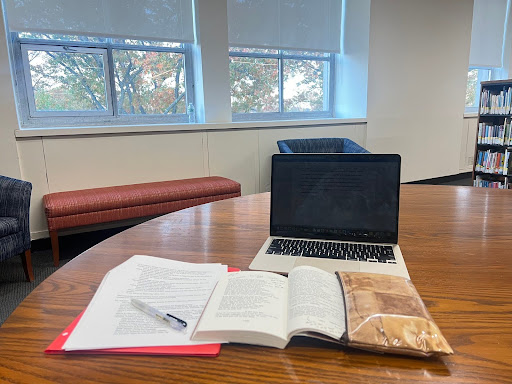
When it comes to the phenomenon of writer’s block, every student will inevitably feel the feeling of not knowing what to write at least once in their academic career. It can be easy to become discouraged when struggling with writer’s block, whether it happens while working on a short response or a longer paper. Writer’s block manifests itself in different ways for each person — including fear, perfectionism or self-criticism. However, with the proper tactics, any student can overcome writer’s block and proceed with their piece.
Free Writing
Free writing is all about stream of consciousness — simply let your brain run wild and let the words flow, even if they may seem incoherent or nonsensical. By doing this, ideas are released in an uninterrupted form, allowing students to unload their thoughts without striving for perfection in the first draft of an assignment.
Though it may seem counter-intuitive since this style of writing is not often taught or emphasized, students should try to avoid censoring their ideas while writing, at least at first. Stream-of-consciousness writing reduces the chance that you will accidentally censor a good idea; so, there will be a higher chance of developing an argument from an idea that was quickly mentioned in free writing.
Sleep On It
An integral part of the writing process is sleep, as it enhances the creative process and problem solving skills. Lack of sleep reduces a student’s mental endurance, causing a tired feeling early on in the process of tackling a lengthy assignment — something that no student wants to feel on top of writer’s block.
Sleep is not only beneficial to clear the mind of stressors, but it allows students to come back with a refreshed perspective. Even when students consciously take a break from an assignment, the brain is still processing, taking in and organizing information. Incubation, or the process of development, is essential for creative insights, as it allows the brain to work in an unconscious state.
Switch Tasks
Though it may be a common conception that can cause an overwhelming feeling, multitasking is actually a beneficial way to reset a student’s mind when studying, completing homework or writing a paper. By shifting attention to a different project for a short time, a student returns to the first project with a refreshed mind.
Multitasking, or switching focus, allows your creative juices to start flowing again; when focusing on a new task at hand, the older assignment may be easier to tackle when going back. There may be a new perspective or a new swing of momentum to find for a project by simply looking away from it for a while.
Prioritize Progress, Not Perfection
One of the most detrimental causes of writer’s block is self-criticism in the form of perfection. When writing, students often strive for perfection the first go around; this makes the writing process extremely intricate and sluggish, resulting in a dreaded feeling when it comes to writing.
A significant way to combat this is to prioritize progress and to realize that no matter who you are, whether you be a New York Times bestselling author, a top-notch journalist or simply somebody who enjoys writing, nobody’s perfect.
Producing drafts of writing will make space for revisions and corrections instead of trying to get the product perfect on the first try. Students should try to take this pressure of perfection off themselves, as it only results in negative effects like writer’s block, which almost ensures increased difficulty in the writing process.







